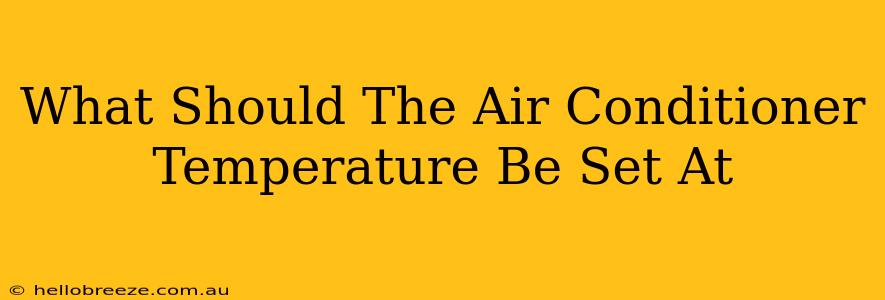Summer's heat can be relentless, making your air conditioner your best friend. But with energy bills a concern, finding the perfect AC temperature setting is key. This guide helps you determine the ideal temperature for your home, balancing comfort with energy efficiency.
The Goldilocks Zone: Finding the Right AC Temperature
There's no single "perfect" temperature, as comfort is subjective and depends on several factors. However, the ideal air conditioner temperature is generally considered to be between 72°F and 78°F (22°C and 26°C). Many experts recommend setting your thermostat at 78°F (26°C) during the day while you're away or asleep, then lowering it to a more comfortable level – say, 72°F (22°C) – when you're home and active.
Factors Influencing Your Ideal Temperature:
-
Personal Preference: What feels comfortable to one person might feel too cold or too warm to another. Consider the preferences of everyone in your household.
-
Health Conditions: Certain health conditions, like allergies or respiratory issues, can influence your comfort level. Consulting your doctor can help determine an optimal temperature for your specific needs.
-
Activity Level: If you're engaging in strenuous activity, you might prefer a slightly cooler temperature.
-
Humidity Levels: High humidity can make even a cool temperature feel sticky and uncomfortable. A dehumidifier can be a helpful addition to your cooling system.
-
Insulation and Window Treatments: Proper insulation and energy-efficient windows and blinds help maintain a consistent temperature, reducing the strain on your AC unit.
Energy Savings: Smart Thermostat Strategies
Setting your thermostat higher when you're away or asleep is one of the best ways to save energy and lower your electricity bill. Consider investing in a smart thermostat, which can learn your preferences and automatically adjust the temperature accordingly. These thermostats often offer features like:
-
Geofencing: Automatically adjusts the temperature based on your location.
-
Scheduled Cooling: Allows you to program specific temperatures for different times of the day.
-
Energy Usage Tracking: Helps you monitor your energy consumption and identify areas for improvement.
Beyond Temperature: Optimizing Your Cooling System
While the temperature setting is crucial, remember that other factors impact your comfort and efficiency:
-
Regular Maintenance: Regularly cleaning or changing your air filters prevents dust buildup and ensures efficient airflow. Schedule professional AC maintenance at least once a year.
-
Proper Ventilation: Ensure adequate ventilation throughout your home to prevent stagnant air.
-
Strategic Window Coverings: Using curtains, blinds, or shades can reduce solar heat gain, minimizing the strain on your AC.
Conclusion: Find Your Perfect AC Balance
Finding the right air conditioner temperature is a balancing act between comfort and energy efficiency. By considering individual preferences, health factors, and implementing energy-saving strategies, you can create a cool, comfortable, and cost-effective home environment throughout the summer. Remember to consider the factors mentioned above to fine-tune your AC settings and truly enjoy the benefits of a well-regulated cooling system.

